CHINESE WESTERN CLASSICAL MUSIC COMPOSERS
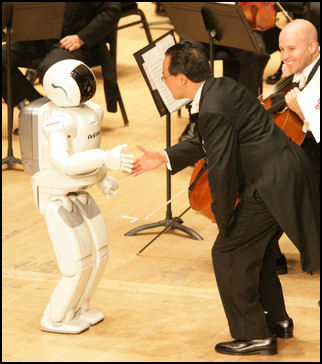
Yo Yo Ma with the robot Asimo Chou Wen-chung (1923-2019), a Columbia University professor born in Yantai, is widely considered the dean of Chinese composers. Chen Qigang is a Chinese composer known for “elegantly fusing” Western-modernist and traditional Chinese elements.” He lived in Beijing during the Cultural Revolution, moved to Paris in 1984 and returned to China in 2007. He wrote and arranged the music for the Beijing Olympics in 2008.
The composer Guo Wenjing spent his career in China and for a time chaired the composition department at the Central Conservatory, a job he didn’t like. Influenced by Bela Bartok, who immersed himself in Eastern European folk music, he spent part of his career collecting folks songs in the mountains around the Yangtze River. His works include tributes to Genghis Khan and the poet Li Bai, theater pieces such as “Wolf Cub Village” and the symphonic pieces “Sorrowful, Desolate Mountain” and “Suspended Coffins on the Cliffs of Sichuan”.
Composer Wang Xilin’s “Symphony No. 9: “Requiem for the War of Chinese People’s Resistance Against Japanese Aggression and the World’s Anti-Fascist War” is a haunting requiem to the millions of Chinese who lost their lives in World War II and the Japanese occupation of China. — and by allusion to millions who died under Mao during the Great Leap Forward and the Cultural Revolution other Maoist era tragedies It was conceived in the 1960s but not written down until decades later. It was finally performed — only once — by the China National Symphony Orchestra and its choir in 2015. [Source: Didi Kirsten Tatlow, New York Times, December 11, 2015]
In 2017, Shanghai-born, New-York-based Du Yun won the Pulitzer Prize for music for her opera “Angel's Bone”. Du Yun (born 1977) is a composer, musician and performance artist.The Pulitzer jury described her piece as a bold work "that integrates vocal and instrumental elements and a wide range of styles into a harrowing allegory for human trafficking in the modern world." Angel's Bone, which has a libretto by Royce Vavrek and was staged for the first time in January 2016, tells of a middle-American couple who find a pair of angels dropped into their backyard. They nurse the angels back to health — only to clip their wings and exploit them for money. Du Yun has released a an album of pop music and been commissioned by American orchestras such as the Detroit and Seattle Symphonies. [Source: Tom Huizenga, NPR, April 10, 2017]
See Separate Article MUSIC, OPERA, THEATER AND DANCE factsanddetails.com ; WESTERN CLASSICAL MUSIC IN CHINA factsanddetails.com ;
RECOMMENDED BOOKS AND MUSIC: “Journey of a Thousand Miles: My Story” by David Ritz, Lang Lang, et al. Amazon.com; “Best Of Lang Lang” (CD) Amazon.com “Romance” by Lang Lang (CD) Amazon.com; “Yo-Yo Ma: A Biography” by Jim Whiting Amazon.com; “Essential Yo-Yo Ma” (CD) Amazon.com “Rhapsody in Red: How Western Classical Music Became Chinese” by Sheila Melvin and Jindong Cai Amazon.com ;“Pianos and Politics in China: Middle-Class Ambitions and the Struggle over Western Music” by Richard Curt Kraus (1989) Amazon.com; “Music in China: Experiencing Music, Expressing Culture (Includes CD) by Frederick Lau Amazon.com; The Very Best Of Chinese Music by Han Ying, Various Artists, et al Amazon.com; “The Music of China's Ethnic Minorities” by Li Yongxiang Amazon.com; “Music, Cosmology, and the Politics of Harmony in Early China” by Erica Fox Brindley Amazon.com; “Chinese Music and Musical Instruments” by Qiang Xi (Author), Jiandang Niu Amazon.com; “Rocking China: Music Scenes in Beijing and Beyond” by Andrew David Field Amazon.com;
Tan Dun
Tan Dun is China’s best known Western classic music composer. Like Chen he was one of 100 students chosen from 18,000 applicants to attend the Central Conservatory when it reopened in 1978 after Mao’s death. In the 1980s he moved to New York and immersed himself in the various scenes there, particularly the one surrounding John Cage, and created an accessible avant guard music himself that combined romantic melodies with chance processes and natural noises in pieces like “Organic Music” and “Water Concerto.”
Tan won an Oscar for his score for the film “Crouching Tiger, Hidden Dragon”. He also won a grammy and composed the music for medal ceremonies at the 2008 Beijing Olympics, In the spring of 2008, the New York Philharmonic presented the premier of Tan Dun’s Piano Concerto with Lang Lang as a soloist and the Metropolitan Opera performed Tan’s 2006 “First Emperor” with Placido Domingo singing the title role. Tan Dun is known incorporating natural sounds like wooden blocks and flags snapping in the wind into his pieces. He developed a kung-fu piano concerto which Lang Lang described in Time as “lots of extreme finger movements and using elbows and palms to play. It was like watching Jackie Chan fight.”
“Water Heavens”, a program created by Tan in 2010 that combines music and architecture, is performed in Zhujiajiao, a water town in Shanghai. Zhang Qian wrote in the Shanghai Daily: “A concert hall, also called Water Heavens, was constructed specifically for the composition and is connected to a canal. The canal’s water plays a vital role in the program, and audiences can expect to witness multiple-layer communication between East and West, architecture and music, nature and people, Buddha and god. Conceived for strings and vocals, and, of course, water, which plays a central role, Water Heavens is a multidisciplinary piece. [Source: Zhang Qian, Shanghai Daily, January 23, 2016]
“The performance usually starts right when Buddhist monks at the opposite river start their evening chanting. As the monks raise their sung prayers, the string quartet sets in with a piece by Johann Sebastian Bach. The stage is partly submerged in water, and as musicians rock their bodies and move their feet while they play, the sound of splashing water becomes part of the performance. From the dome, artificial rain showers pour onto certain areas around the audience and the musicians. Varying in intensity, the dripping water also adds to the holistic experience. Even the steel stairs at one side of the concert hall are used to create sounds with performers stepping on them to bring the audience to a unique music world where Bach meets Zen.
“Inspired by Tang Dynasty (618-907 AD) poet Li Bai’s comment about the beautiful sound of water in nature, Tan created his first “organic” composition — “Water Concerto for Water Percussion and Orchestra” in 1998. He later completed the series with “Paper Concerto for Paper Percussion and Orchestra” in 2003 and “Earth Concerto for Stone and Ceramic Percussion and Orchestra” in 2009.
Chinese Western Classical Music Conductors and Musicians
The take on Asian musicians was that could play with technical great skill but could not play with same heart and soul and depth of European and American musicians. There was a hint of racism with these statements. The same used to be said about the Jews. Yo Yo Ma is largely credited with putting such views in the dustbin.
Famous Chinese Western classical musicians include female pianist Wu Qian and soprano Liping Zhang. Vanesa Mae, Thai-Chinese-British violinist, made a name for herself in the 1990s as a teenager when she appeared on MTV playing Bach in a wet teashirt. Her full name of is Vanessa-Mae Vanakorn Nicholson. Xi Chen of China and Tamaki Kawakuno of Japan shared the top award in the violin category at the 12th Tchaikovsky Contest in June 2002. In June 2009, a blind Japanese named Noboyuli Tsujii and a Chinese teenager named Zhang Haochen shared the top prize at the Van Cliburn International Piano Competition in Ft. Worth Texas.
Long Yu (born 1964) is China's leading conductor. Artistic director and chief conductor of the China Philharmonic and of the Shanghai Symphony Orchestra, he has conducted the New York Philharmonic to celebrate the Chinese New Year with a concert featuring Yo-Yo Ma on cello for the first US performance of modern Chinese composer Zhao Lin's "Duo", which also features the sheng — a bamboo reed instrument common in Chinese operas. Long Yu told The New Yorker, “I do my best to serve the people who really need fine arts and classical music. I do not have the duty to make everyone like it.” [Source: AFP, January 29, 2015]
According to AFP: “A tall man with a sturdy build, Yu offered a vigorous but firm lead to the New York Philharmonic ... Yu — whose grandfather, Ding Shande, was a prominent composer who died in 1955 — felt the Cultural Revolution first-hand as a child. "For almost eight or 10 years, we could not in public openly discuss doing classical music. It was quite a difficult time. Our whole classical music life really started 30 years ago," he said. Yu himself has pushed the envelope on political boundaries. He helped bring to mainland China the National Symphony of Taiwan — which Beijing considers a renegade province — and conducted the China Philharmonic in Rome in a performance attended by then pope Benedict XIV, even though Beijing has no diplomatic relations with the Vatican.
Jindong Cai (born 1956) is an orchestra conductor and a professor at Stanford University. Borning Beijing, he has conducted many orchestras in China and has been a guest conductor at numerous orchestras in the United States since moving there in 1985. With his wife, the writer Sheila Melvin, he has written numerous articles on China and two books on music in China: “Rhapsody in Red: How Western Classical Music Became Chinese” and “Beethoven in China: How the Great Composer Became an Icon in the People’s Republic.” [Source: Ian Johnson, Sinosphere, New York Times (November 22, 2015]
From “Mao to Mozart: Isaac Stern in China”, directed by Murray Lerner, won an Oscar for best documentary
Fou Ts'ong
Fou Ts'ong(1934-2020) was the first Chinese pianist and classical musician to win global acclaim and success. According to the BBC: “Fou was born in China in 1934 to a family of China's intellectual elite. He first heard western classical music at a young age when his father returned to China after several years living in France. As a budding pianist, he studied with the founder and head of the Shanghai Symphony Orchestra, Italian conductor Mario Paci, who had been crucial in bringing western classical music to China. He lived in London since the 1950s.[Source: BBC, December 30, 2020]
“Aged 19, Fou left China to continue his musical education in Europe, moving to then-Communist Poland to study in Warsaw. Two years later, he won awards and international recognition at the prestigious Chopin competition in the city. In 1959, Fou moved to London and grew into an internationally acclaimed soloist, playing both in Europe and the United States, and performing in 1967 at the BBC's First Night of the Proms.
“In 1960 he had married Zamira Menuhin, the daughter of the renowned violinist Yehudi Menuhin. The couple had a son and divorced in 1969. Fou later married the Chinese pianist Patsy Toh and had another son. While he was living in London, Fou's parents were persecuted in Maoist China during the anti-intellectual Cultural Revolution. They took their own lives in 1966.
“Staying true to his earlier training in Poland, Fou became especially known for his interpretations of Chopin. He continued to be associated with the Polish composer, and the Chopin Institute said in a statement on Wednesday that his death marked "the closure of an extremely important page in the Chopin tradition". “We say goodbye to the master, musician, philosopher who, like no other, was able to tell the world the greatness of Chopin through words, but above all through his play," the institute said.
After Fou Ts'ong’s death in 2020, “French pianist Francois Guy wrote that Fou had been his "mentor and a musical father". “His Debussy, Chopin and Mozart remain legendary." Lang Lang said: that Fou had been a great inspiration for him and gave him support. “I still remember the time when I played Rachmaninov's Piano Concert No. 3 for the first time in London in 2001. After the concert, he gave me a hug with tears in his eyes, and said that he had high hopes for me,.Master Fou was a great artist that I respected very much. I will never forget what he said about always staying kind and pure-hearted. His understanding of music was unique."
Fou Ts'ong’s father was well-known intellectual and translator Fu Lei, who himself had a strong passion for music. His wife — Fou Ts'ong’s mother — was an accomplished classical pianist Fu Cong (Fou Ts'ong) was their oldest son and the set the goal of making him a pianist. Fu oversaw his son's many daily hours of practice, punishing the child for lack of diligence and ultimately pulling him out of school. He hired tutors to teach Fu Cong math and English, and educated him in the Chinese classics himself, focusing on narrative and pastoral poetry. When his son left for Poland to participate in a piano competition, Fu Lei wrote, "He knows that he has taken only the first step in a rich limitless world of artistic opportunity. My hope for him — as I told him before he left for Poland — is this: 'You must first of all be a man, then an artist, then a musician and lastly a pianist.'" Fou Ts'ong’ went on to win third prize in the 1955 Chopin Competition — an astounding feat for a Chinese pianist of that era — and stayed in Poland to study. Fu Lei then began to write a series of 200 letters to his son, filled with his thoughts on life, and emphasizing the need to remain humble and innocent in service of great art.
Yo Yo Ma
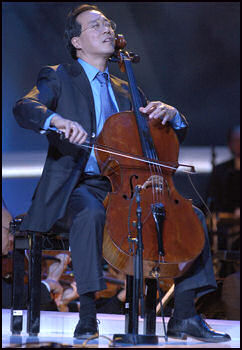
Yo Yo Ma at Nobel Prize ceremony
The cellist Yo Yo Ma is one of the world’s most recognized classical musicians. A child prodigy, along with his violin-playing sister, Yo Yo Ma s widely regarded as the world’s best cellist and is perhaps the richest classical musician.
Ma has recorded more than 70 albums and won 15 Grammys. He has worked with Brazilian guitarist Oscar Castro-Neves and film composer Enrico Morricone and recorded pop, jazz and folk tracks and appeared in film scores, including “Memoirs of a Geisha”, “Seven Years in Tibet” and “Crouching Tier, Hidden Dragon” and performed at the White House for five U.S. presidents. Ma performed at the inauguration of U.S. President Obama but a recording of his music was broadcast due the frigid temperatures that day.
Ma’s main performance instrument is a Domenico Mantagnana cello, made in 1733 in Venice. In 1999, he left the priceless instrument in a taxi and managed to recover it later undamaged,. He also owns a 1712 Davidoff Stradivarius left him by Jacqueline Dure on her death in 1987.
One his greatest accomplishments is being able to play what is mostly chamber music — music that is just that, meant to be played in a room rather than concert hall — in front of an audience made up of thousands. Daniel Ginsberg wrote in the Washington Post, Ma “projects his sound as well as any vocalist...At its heart is focused tone, shimmering and golden. He revels at the center of a phrase, never playing catch up or rushing. He attacks the long phrase or dense harmonics accurately and departs cleanly.”
Yo Yo Ma’s Life
Yo Yo Ma is an American of Chinese descent. He he was born in Paris in 1955 to ethnic Chinese parents and came to New York in 1962. He took up cello at 4, played publically at 5, and performed before U.S. President John F. Kennedy when he was eight. He was spotted as an infant prodigy by the violinist Isaac Stern. He attended Julliard and studied under Leonard Rose and Janos Scholze.
Yo Yo Ma attended Columbia, dropped out without telling his parents, and finally graduated from Harvard with a degree in anthropology in 1976. He made his first recording at age 22. In 1978 he received the Avery Fischer prize for outstanding achievement in classical music. He now lives in Cambridge, Massachusetts with his wife Jill Hornor, arts consultant who Ma married in 1978. They have two children.
Yo Yo Ma’s mother was a singer. His father was a music professor who left China in 1945 and lived in France for 27 tears before coming to the United States in 1961. Ma said the most frequently asked he question he received for many years was: “How can an Asian play Western music?”
Yo Yo Ma’s Silk Road Project
In recent years has been very involved in his Silk Road Project,” which intends to introduce music from countries along the Silk Road to the world (See Silk Road) in China and elsewhere he has set up workshops in which children make “slengs”, traditional Chinese instruments, from plastic bottles and straws.
The Silk Road Project was founded in 1998. It is a collection of 60 or so people that not only includes musicians and singers but also embraces composers, storytellers and visual artists. As of 2008, 64 pieces had been written for the Silk Road Project by composers from 17 countries, including Mongolia, Tajikistan , Uzbekistan and Iran.
With the Silk Road Ensemble Yo Yo Ma not only plays the cello but also plays the Mongolian horsehead fiddle. He told the Times of London, “The project was a quest for personal renewal after decades of working within the comparatively narrow parameters of classical music. It was crossing the line into the unknown.”
Lang Lang
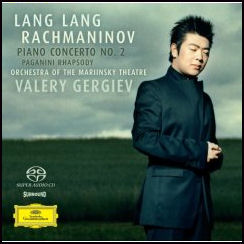 Lang Lang has been billed at the ‘superstar Chinese pianist.’ The first Chinese pianist to play with the world’s top orchestras, he commands among the world highest fees for solo performances. His recordings top classical music harts and have also placed on some pop music charts. His hands are insured for seven figures which he says is a “fair price.” The English translation of his name is “Brilliant Brilliant.” [Source: Emma Pomfret, Times of London, April 2009]
Lang Lang has been billed at the ‘superstar Chinese pianist.’ The first Chinese pianist to play with the world’s top orchestras, he commands among the world highest fees for solo performances. His recordings top classical music harts and have also placed on some pop music charts. His hands are insured for seven figures which he says is a “fair price.” The English translation of his name is “Brilliant Brilliant.” [Source: Emma Pomfret, Times of London, April 2009]
Regarded as a playboy and a showman in the tradition of Chopin, Lang Lang made his Carnegie Hall debut when he was 18. He has played for Placido Domingo and at the opening ceremony for the 2006 World Cup and played a duet with five-year-old Li Muzi before a television audience of five billion people at the Opening Ceremonies for the Olympics in Beijing in 2008. He has served as a UNICEF goodwill ambassador and has been selected to help promote the Shanghai World Expo in 2010. By one estimate the “Lang Lang” affect has prodded 36 million Chinese children to take up the piano.
Lang Lang was selected by Time magazine in 2009 as one of the world’s most influential people. In the profile jazz pianist Herbie Hancock wrote, “He’s so warm and funny. It took me by surprise, because I think of classical music as being so serious...When he just messing around — which he does alot — he’ll play comic riffs that sound like they’re from cartoon music...But his playing is also so sensitive and so deeply human...You hear him play, and he never ceases to touch your heart. And he’s fearless. He’s not afraid to burst the bubble of false elitism. He’s wear a new kind of tux, with tennis shoes, That’s cool.” Lang performed with Hancock at the Grammys and the two toured together in 2009.
Lang Lang lucrative endorsement deals with Audi and Rolex. He has his own line of Adidas sports shoes, Steinway kids pianos, Montblac watches and scarves by the Chinese designer Shanghai Tang. Not everyone is enamored with him. The conductor Andre Previn dismissed the way he raises his eyes upward and rocks on the piano stool as a “circus act.”
Book: “Journey of a Thousand Miles” by Lang Lang
Lang Lang’s Life
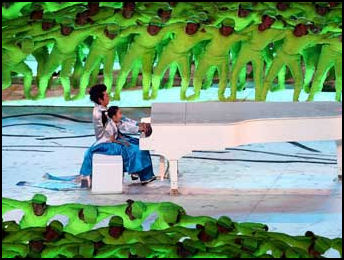
Lang Lang at the 2008 Olympics Lang Lang was born in 1982 in the northeast industrial town of Shenyang into a one-child-policy family. He said he was inspired to play the piano at age two by a Tom and Jerry cartoon.
His parents bought him his first piano when he was two with half their annual salary and focused their own ambition on him. His father, whose own musical dreams were dashed by the Cultural Revolution, pushed him to become a pianist. His mother stayed in Shenyang and supported the family working as telephone operator when nine-year-old Lang Lang and his father studied at the Central Music Conservatory in Beijing while living in an apartment without heat,
Lang Lang and his family’s ambitions were dealt a severe blow when a professor, acting on false denunciation of Lang Lang’s family, claimed that young Lang Lang had no talent. Lang Lang’s father freaked out and insisted his son work harder One afternoon when Lang Lang returned home from school late his father went bezerk: “You’ve missed nearly two hours of practicing and you’ll never get them back! Everything is ruined! You can’t go back to Shenyang...Dying is the only way out!” He then gave Lang Lang the choice of jumping off the balcony or overdosing on antibiotics.
Lang Lang responded by viciously beating his hand on the wall, ‘stop!’ his father shouted. “You’ll ruin your hands.” His son replied, “I hate may hands, I hate you. I hate the piano.” Recalling that period, Lang Lang told the Times of London, Beijing was “a really dark time. We got destroyed — not only my father but myself. I lost confidence and I thought of giving up. I stopped playing for a while.”
On developing his talent at an early Lang told Time, “Once you are a pianist, you need to give up part of your childhood. I was always jealous of other people when they would go to the park and I would be practicing like I was in a zoo.”
Lang Lang Today
Lang Lang has a chubby, smooth-skinned face and stiff, spiked hair that almost look like a mohawk,, Offstage he sports jeans, sweaters and silk scarves and sometimes wears the same style of clothes on stage.
Lang Lang’s mother and father often travel with him. His mother serves as his photographer. His father often comes on stage to do accompany him on the erhu (a Chinese violin) for an encore.
Lang Lang said that in his entire life he has only enjoyed one month of “normality.” That was in 2004 when he injured his right hand and had to rest it. “That was the best month without hesitation. I had a date, I saw a Broadway show, saw Britney Spears in concert.”
Lang Lang played at the black tie dinner Chinese President Hu Jintao at the White House in January 2011. He was criticized for playing “My Motherland” because the song happened to come from a 1956 anti-U.S. film, set in the Korean war, called “Battle on Shangganling Mountain”. On his website Lang answered his critics by saying: “I selected thing song becuase it has been a favorite of mine since I was a child. It was selected for no other reason but the beauty of its melody.”
In October 2013 Lang Lang was selected as a United Nations Messenger of Peace, a role he called more important than his music because it can help improve the lives of children around the world through education.
Lang Lang and Music
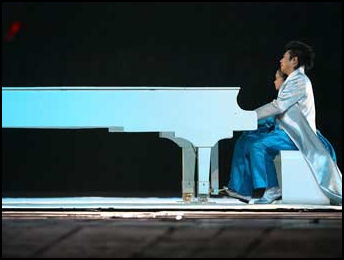
Lang Lang at the 2008 Olympics To stay in top form Lang Lang spends five days every two months in Berlin, studying with conductor and pianist Daniel Barenboim. He told the Times, “It’s without interruption, no interviews, no telephone calls, no other things, we think that’s the only way to study.”
Lang Lang has said he loves opera, jazz and hip hop. On his favorite pianist he told Time, “I call Vladimir Horowitz “the Magician.” He made everything so simple, it was like magic. When Arthur Rubenstein plays, he brings his heart out to you. It’s so personal and so warm. And Glenn Gould is a unique genius. You’ve probably heard many pianists playing the same work, but when you hear Gould, it’s like it’s brand new.”
Lang Lang doesn’t shy away from Chinese music . He recorded an album of traditional Chinese classics called “Dragon Songs” that included titles like “Spring Flowers in the Moonlight Night on the River”. In addition, he gave a premier of a concerto by Tan Du.
A great deal has been written about the rivalry between Lang Lang and Yundi Li. Li was dropped in the late 2000s by Deutsche Grammophone, the label that Lang Lang records on. Although he has barred orchestras from playing with Yundi in the same season, Lang Lang said the “he or me” rumors are untrue. “No! This is a very bad thing to do and totally not true,” he told the Times. “This is not allowed in the real world: I have no right to say anything about other artists. It’s his career.”
The Lang Lang International Music Foundation introduces classical music to kids and provides scholarship for gifted pianists. It is sponsored by UNICEF and Montblanc. Lang Lang has appeared on “Sesame Street” and visited kids in Africa. “I know I have responsibility,” he told The Times, “because the world needs to open more markets for classical music. I hope I can deliver that.”
Lang Lang’s Playing
Spengler wrote in the Asia Times,”But whatever makes Lang Lang so beloved among audiences, in a field where thousands of other pianists evince perfect technique, surely includes his own enjoyment of what he does. He is not the greatest interpreter of Mozart, surely no Murray Perahia or Radu Lupu. But he is an engaging personality whose connection to the music is manifest.” [Source: Spengler, Asia Times, December 2, 2008]
“A case in point is Lang's reading of Mozart's C Minor Concerto K 491, with Long Yu conducting the China Philharmonic, available on Youtube). This work presents a famously enigmatic theme that immediately chases itself into a chromatic sequence, only to be interrupted by yet another chromatic sequence in a different voice, before it stumbles into a concluding cadence. Underneath this, the informed listener senses, there must lurk the familiar four-bar phrase of popular music, but Mozart never once spells this out. He leaves us off-balance at every point. It is a romping-ground for musical surprise, an enchanted forest of tricks and track-backs in which the true path always is obscure.”
“When the Mozart C Minor Concerto is performed properly, there shouldn't be a dry seat in the house. In the version available at Youtube, Lang Lang smiles and sometimes grimaces in appreciation of Mozart's jokes. One may fault him for losing the comedian's dead-pan, but surely that is preferable to not getting the jokes at all. The pianist is beset by a sense of wonder at Mozart. That is a very good thing, because the Chinese nation that looks to Lang Lang as one of its heroes is learning the high culture of the West with a collective sense of wonder.”
Lang Lang and Performing
Before a concert in Hamburg he had three pianos to choose form: a new model from Steinway’s Hamburg factory, “the house piano” which he has recorded with twice, and another Steinway brought in from Leipzig. He chose the second one. After his performance was over he received a ten-minute standing ovation.
Lang said,, “the bigger the venue is the better. Every time I go back to China, I play in stadiums that fit 10,000 to 12,000 people, They cheer like it’s a pop concert. After the show, I need to wait two hours before I can get out of the stadium.”
New York Times critic Anthony Tommasini wrote Lang Lang “has a penchant for interpretive exaggeration. His playing can be so intensely expressive that he contorts phrases, distorts musical structure and fills his music-making with distracting affectations.” Alex Ross wrote in The New Yorker: “Lang Lang feels the music at you. He advertises his love of performing simply by the way he charges on stage...and he creates a giddy atmosphere as he negotiates hairpin turns at a high speed...At times you wish he were a little more impersonal. He tends to impose his ebullience to the music whether or not the music demands it.”
New York Times music critic Allan Kozinn wrote: “You never quite know what you’re going to get at a Lang Lang performance...Passages infused with sublime beauty sit beside sheer display, some virtuosic and brilliant, some veering headlong into vulgarity.” On his encore, Chopin’s Etude in E,, “he played its outer sections with a refined tone, letting the plaintive supple theme sing over a gauzy accompaniment. But in the short bravura middle section Mr Lang pummeled the keyboard with all his might.”
Yundi Li
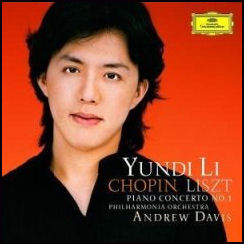
Yundi Li is considered one of the world's best pianist. A native of Sichuan, he is the youngest pianist ever to win the prestigious Chopin Piano Competition, which is held every five years in Warsaw. He won the award at the age of 18 in 2000 and received the first gold medal since 1985 (in 1990 and 1995 no musicians was regarded as worthy of winning the award). Li’s compatriot Chen Sa came in forth.
Yundi Li is known as China's "Piano Prince". After the his success in the Chopin Piano Competition he went on to perform all around the world and is a household name in the Chinese speaking world. On his performances, Alex Ross wrote in The New Yorker,”His playing is refined, almost severe. He has an intelligent way of shaping phrases, controlling dynamics, varying articulation...He’s a more naturally poetic soul than Lang Lang.” His performances he said, are “the kind that you remember, as much for its quiet stretchs as for its “wow factor.”
In 2021, Yundi Li was detained for soliciting a prostitute. Beijing police said in an online post: A 39-year-old and a sex worker, 29, have confessed to the illegal activity. They were caught after authorities received tip-offs from the public. While the police did not publish his full name in the notice, state media outlets later confirmed the 39-year-old was Li. [Source: BBC, October 22, 2021]
The BBC reported: After the news broke, the Chinese Musicians' Association said that it would revoke Li's membership as he represents "extremely negative social impact". Some observers said that his detention could be seen as a warning to other "immoral" celebrities as China ramps up its recent crackdown on the entertainment industry Under Chinese law, those who solicit or manage sex workers can be detained for up to 15 days and fined up to 5,000 yuan ($782).
The news shocked many fans. "Oh my god, I can't believe it. Is this really the same Yundi Li that we admire so much?", one person wrote on Weibo. Others expressed scepticism at how he was caught. "I'm curious to know how the public found out about him. When you see a 39-year-old man and a 29-year-old woman go into an apartment building together, how did people know that it's a prostitute and her customer? Why not a married couple, friends, hookup buddies?", a Weibo comment read.
Image Sources: 1) Yo Yo Ma, Honda and Nobel prize com; 2) Lang Lang and Yundi Li albums, Amazon; 3) Olympics, Beijing Organizing Committee for the Games of the XXIX Olympiad
Text Sources: New York Times, Washington Post, Los Angeles Times, Times of London, National Geographic, The New Yorker, Time, Newsweek, Reuters, AP, Lonely Planet Guides, Compton’s Encyclopedia and various books and other publications.
Last updated November 2021
